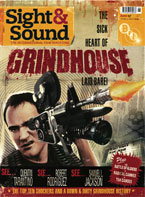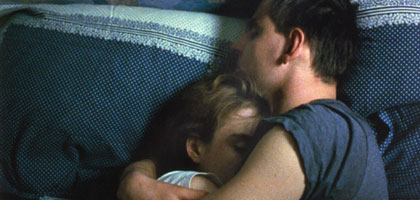
Fire eats the soul
Film of the Month: Longing

'Longing' probes the fragile nature of happiness and the desires that bubble unbidden beneath seemingly idyllic lives. It's a reinvention of the Heimat films with the quiet detail of the Dardennes, says Catherine Wheatley
Valeska Grisebach's Longing wears its Teutonic heritage on its sleeve. Its protagonist Markus, a metalworker and volunteer fireman, is seemingly happily married to his childhood sweetheart Ella when the sudden violence of another couple's attempted suicide erupts into his life, its shockwaves perhaps prompting him to begin an affair with Rose, a waitress he meets during an away weekend with the fire service. Grisebach's idyllic portrait of the bucolic backdrop to Markus and Ella's marriage mixes postcard landscapes with scenes of villagers eating, drinking and celebrating in traditional style - the men swigging schnapps, the women cutting kuchen - in an echo of the Heimat films that extolled rural German values for audiences from the 1930s to the 1950s. The latent violence that pervades Longing also chimes with the atmosphere of later rethinkings of the genre by mainly Austrian directors such as Wolfram Paulus, Peter Patzak and Wolfgang Glück. Grisebach studied under Patzak, Glück and Michael Haneke at the Vienna film academy, and Longing's opening image of a couple smashing their car into a tree recalls the nihilistic ending of Haneke's 1979 TV film Lemmings.
That Grisebach picks up where Haneke left off perhaps suggests the opening of a new chapter in German-language cinema. For while Grisebach and her contemporaries are undoubtedly influenced by their predecessors, their films tend to eschew the social agenda that marked the new German cinema of the late 1970s and early 1980s. As in recent films such as Stefan Krohmer's Sommer '04, Barbara Albert's Fallen and Andrea Staka's Das Fraülein, the concern of Longing is not politics but people. Indeed, if the key term that defined the cinema of the previous generation was abreagierien - to give vent to frustration - the title of Grisebach's film sums up the themes of more recent work that focuses on the minutiae of the desires and disappointments that characterise human relationships.
Here 'longing' implies a bittersweet yearning for the life not lived, the feeling that underlies an extra-marital affair driven by curiosity rather than unhappiness. Markus experiences his small-town life as neither joyless nor confining: the establishing sequences evoke simple pleasures as he and Ella conduct a quiet conversation at their kitchen table or coil around each other in sleep. "I would do anything for you," he says as he leaves for the fateful weekend when he meets Rose. The scenes he shares with his mistress show us another Markus, a man who dresses in a pristine cricket sweater rather than a fleece and hiking boots, who sips sekt on the lawn rather than chugging beers around a bonfire. Yet neither life is presented as better or worse than the other.
The suicide attempt that opens the film infuses what follows with a sense of fatality and amorphous dread. We know something is going to go wrong, but not what, so when the unpredictable and terrible climax arrives there is nevertheless a feeling of inevitability about it. The viewer initially assumes it will be Ella or Rose who will cast a shadow over Markus' life. Rose's beatific smile when she greets him the morning after their first liaison suggests the exaggerated emotions of a future stalker; Ella's desperation to cling to her husband both physically and emotionally hints at the insecurity of a damaged child. Yet as the film unfolds neither woman emerges as either demon or angel - and Markus' affection for each seems genuine. If nothing else, Longing offers a welcome antidote to the Fatal Attraction-style polarities of wife and lover, good woman and whore. Both relationships have a validity that renders the notion of choosing between them as difficult for the audience as it is for Markus himself.
More extraordinary still is the fact that the film never vilifies Markus, despite his cowardice - or greed - and its increasingly horrific consequences. Grisebach's admirable lack of judgement and neutrality towards her characters (and her choice of non-professionals to play them) derive perhaps from her background in documentary film: she seems able to maintain a respectful distance while capturing nuances of body language with close-ups and low lighting that convey intimacy rather than claustrophobia. When Markus finally leaves Ella, his decision is relayed in only four shots: a profile of him putting on his coat in the doorway of their home; the back of Ella's downcast head; a bag on a table; and Ella's tear-stained face. Like the Dardennes or Bruno Dumont, Grisebach keeps dialogue to a minimum and allows the camera to linger on her characters' bodies and faces, asking us to scan them for signs of their inner lives.
Nowhere is this more effective than in a series of scenes of physical intimacy between Markus and each of the two women, in which desire is expressed not by ripping off clothes but by a chaste hug, a touch of the face, an extended gaze. On Markus' return, Ella implores him to be more passionate towards her, but the ensuing sex scene plays more like a wrestling match as he gently but firmly resists her attempts to smother him with her love. Not a finger is raised, but the sense of conflict is overwhelming.
If Longing's style and plot recall the bleakness of Haneke and the Dardennes, and of Robert Bresson before them, Grisebach nevertheless introduces a number of novel twists. Her use of music is particularly interesting. In one scene the camera hovers around Markus as he dances alone, eyes closed, sticky-fringed, to Robbie Williams' Feel. The moment is prefigured by elderly couples shuffling a waltz to cheesy German pop and is echoed in a dance with Ella to disco music that seems as much of a struggle as their earlier love-making. Each is an incongruous physical expression of a deeply felt desire that succeeds in being strangely moving as well as mesmeric.
The masterstroke, however, comes with the coda, which effects a change in atmosphere and genre as unexpected and unsettling as the closing moments of Lars von Trier's Breaking the Waves. Sitting on a climbing frame on the same village green from which the injured Markus has just been airlifted, a group of kids discuss the events we have witnessed. It's clear that this is some time later, and Markus' story has gained apocryphal status: he may or may not still be alive and may have made his home with either of the two women. For these kids, Markus' story is "courageous" and "romantic", proof that fate determines our hearts and actions.
While the scene maintains a naturalistic feel, it is in all other respects out of sync with what has gone before. It's a bold move on Grisebach's part that ruptures the safe relationship we've built with the film. Whatever you feel about it (and it has polarised critical opinion), its invention and risk-taking promise much for the future of German-language cinema.
